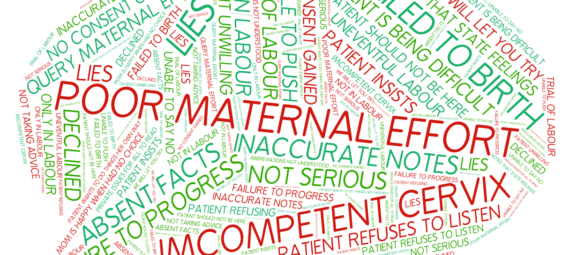
There’s a well-known saying that ‘words can cut like a knife’. What we say can have a lasting effect on the person at the end of the words we use, our words can be uplighting or encouraging but they can also leave wounds that run deep. So what we say matters especially when it comes to pregnancy and birth.
When we think of pregnancy it is a time in a woman’s life when she can be left feeling very vulnerable. As well as a time of great excitement, she may have many questions, fears, worries and concerns, especially if this is her first pregnancy, so it is important that a woman feels like she can ask questions about even the small things that are plaguing her mind. Being open and friendly, showing kindness and compassion, and considering what we say, and the way we say it enables a woman to feel she can approach those providing her care to seek the answers she needs to settle her anxious mind or help her make informed decisions.
The lines of communication need to be open for a woman to discuss things that may affect her and her pregnancy, especially if there has been previous trauma, loss of a baby or she has other health issues. It could be that she doesn’t have much family support or is very young so words used can provide much-needed help and reassurance. For those caring for her always introducing who they are, and their role, is important. Often a woman may see many different people from midwives to doctors, to phlebotomists to support workers, and a friendly hello, telling her your name and explaining what your role will be in her pregnancy helps to build trust in those caring for her.
It is important also that a woman feels listened to, it can be difficult for her to bear her concerns, so the way she is responded to can make her feel reassured and more confident in herself and her body. Open questions can allow a woman to feel comfortable discussing how she really feels. Being honest and giving genuine answers builds trust and relationships that allow for mutual respect, even if that means admitting that we may not know the answer! Also allowing a woman to be ‘herself’, not feeling like she has to put on a brave face but that she is safe and able to convey her true thoughts and feelings. Clarifying what has been said also makes sure that we have understood correctly any concerns and so prevents misunderstanding. Never should conclusions be jumped to, or labels attached to a woman, every woman is an individual, with individual needs and circumstances, and language and words used should reflect this individualised patient-centred care.
Often pregnancy notes can be full of medical terminology and abbreviations that can be scary and bewildering to a pregnant woman and so it is important that time is spent explaining these, answering any questions in a way that doesn’t make the woman feel like it is information she ‘should’ know. We should never hint that these terms are for the health professional’s benefit only and not really anything that she needs to be concerned over, this would only induce more worry and more unanswered questions. Terms such as breech, haemoglobin, fundus, albumin and oedema can be terms that are new to a pregnant woman so it is important that time is available to explain these in a clear, easy-to-understand way, with friendly openness. These words are used every day by those that care for women but for a woman or her partner, these may be terms they have not come across before. While we have provision to search for such terms via the internet, this can be thwarted with dangers of misunderstandings or confusion. Never should anything be written in a woman’s notes that would cause her upset or offence, regardless of its intended recipient.
Many women will now access their pregnancy notes via apps on mobile phones, again however it is important to make sure that women can choose if this is right for them. Women who have economic difficulties or are especially vulnerable due to immigration, domestic violence, language barriers or other concerns should be supported in understanding, accessing and managing their notes, and other forms of communication.
What about birth?
Language used can either build confidence and empower, or tear down and undermine a women.
Birth can be a time of great anxiety or even fear to some women, they may have many concerns about what is going to happen and how they will cope or manage. Pain can distort and confuse and often women feel a sense of losing control and being powerless. This is a critical time when language used can either build confidence and reassure, or tear down and undermine a woman. Phases such as ‘that’s not right’, ‘you must’ or ‘you have no choice’ should have no place in a delivery room. Rather, ‘let’s try’, ‘Do you think you could’ or ‘We could try’ all allow the woman to feel she is still in control, that everyone is supporting her choice and working as a team for the benefit of her and her baby. Commending a woman for doing well goes a long way in building confidence, especially as women can worry they are making a scene, or not birthing how others expect, and a few kind words can ease those concerns. This applies to partners too. They should feel included and welcome, and also part of the birth. Communication around care being given, and also listening to partners as a woman’s advocate is vital. Language can go a long way in supporting a partner to supporting birth for the whole family.
When it comes to the actual birth it is even more important to listen to the woman. She can feel what is happening to her body, where the pain is and what is helping her best. If what is said encourages her to listen to her body, follow its instincts, supports and suggests, rather than demands, we enable the woman to remain in control. However, if what we say casts doubts, puts down, or demands of a woman, we remove choice, remove power, undermine and so create anxiety, panic and doubt. The birth process relies heavily on oxytocin, the hormone that thrives on love. A birthing room should be filled with love in both words and actions. If our words make a woman feel loved, safe, cared for and supported then the process of birth will flow. Never should words make a woman feel that she is a failure, unable to cope, weak, or a burden. Rather words should make her believe that she is amazing and doing well, which builds confidence in herself and her body, regardless of the type of birth. When birth has changed from a wanted journey the right words can help reassure and calm.
Even in an emergency situation our language can either calm and help a woman still feel in control, or our words can raise anxiety and make her feel powerless. It is important that information is clearly given and what is happening is explained in a clear, calm way. This includes listening to when a woman is refusing treatment or questioning why something has been recommended. This enables trust in her care, gives to remain undamaged, it also helps reduce trauma.
Consent is important for any procedure, a woman must feel that she is still in control and that while things may have changed, she is still part of her birth and that what is happening is still her choice. Words at this point can have the most devastating effect. If words used convey that the woman has somehow ‘failed’, that the medical team are frustrated, or if no real explanation of what is happening is given, the effect can be traumatic and can stay with that woman for a very long time. Never should a woman be discussed as if she is not there or talked over, or made to feel like she must do as she is told, without question or explanation. It is good to remember too that what we say should not change out of the earshot of a woman, many times family members have heard unkind comments being said about their loved ones in a corridor or at the staffing station. One woman found out she had lost her baby by hearing two doctors discussing her in the corridor as she was wheeled back to the waiting room, can you imagine the pain that hearing this news in such a way caused her?
Empathy should be reflected in our words too, seeing the world through another’s eyes, ‘walking in their shoes’. Understanding thoughts and feelings as if it was our own, is crucial, think how we would feel if it was our friend, daughter or sister. It means imagining how that woman feels in her particular position and situation, in this way, we are ‘being with the woman’. Our words should show we have empathy, we are concerned, and we care. Body language can convey so much too especially smiling, eye contact and open arms, these back up kind words, encourage discussion and build trust. Have you ever tried to have a conversation with someone who never looks up from their desk?
When words cut deep
Some of the heartbreaking terms some women have had said to them or recorded in notes are, ‘failure to progress’, ‘poor maternal effort’, ‘failed to birth’ (after a caesarean section) ‘unwilling to try,’ ‘unable to deliver her baby’ and ‘why can’t you just do as you are asked’. For a minute just think of those words and imagine them being said to you at work, or college or by someone you trust. Now imagine you are hurt, and in pain, perhaps you have fallen or you have broken a bone. How would you feel if your boss came and said you have “failed to progress, just do as I ask” or the paramedic said “Why can’t you just stand up on your broken bone? or “Are you unwilling to try?“. We wouldn’t accept that as being ok, yet these words can be a reality for many women giving birth, at a time when they are at their most vulnerable. Often when I support women after a traumatic birth they often voice the language used to them. Sadly it is often cruel, stripping them of dignity and respect. I remember being in labour and the midwife telling me over and over I was being a ‘silly girl’, for many months after this would ring in my ears every time I thought about my birth wondering why she viewed me this way.
Of course, all this not only applies to the woman but also to her partner and extended family. I was told by a family about overhearing two midwives discussing them outside the ward describing them as needy, demanding and disruptive. Why? Simply because they had been concerned about the health of their daughter. I’ve heard of doctors who have stood at the edge of women’s beds arguing in a different language so that midwives and families could not understand them. I have also been told by families that they have felt dismissed, a burden, confused and even afraid due to the language used or the tone in which words were expressed to them.
Yes, words matter, they can indeed cut like a knife and leave scars that last a lifetime, people don’t always remember what we do, but the way we made them feel. Words play an important part in this. Words can heal, build up, encourage and empower they can support and build trust, and give comfort. Pregnancy and birth can be a wonderful journey, let’s make sure that the words we use bring joy and happiness and give treasured memories to families everywhere.


